Beyond the Visible: Discovering the Invisible Bonds that Tie Us Together (보이는 것을 넘어서: 우리를 묶어주는 보이지 않는 유대를 발견하기)

Little Prince Chapter 21
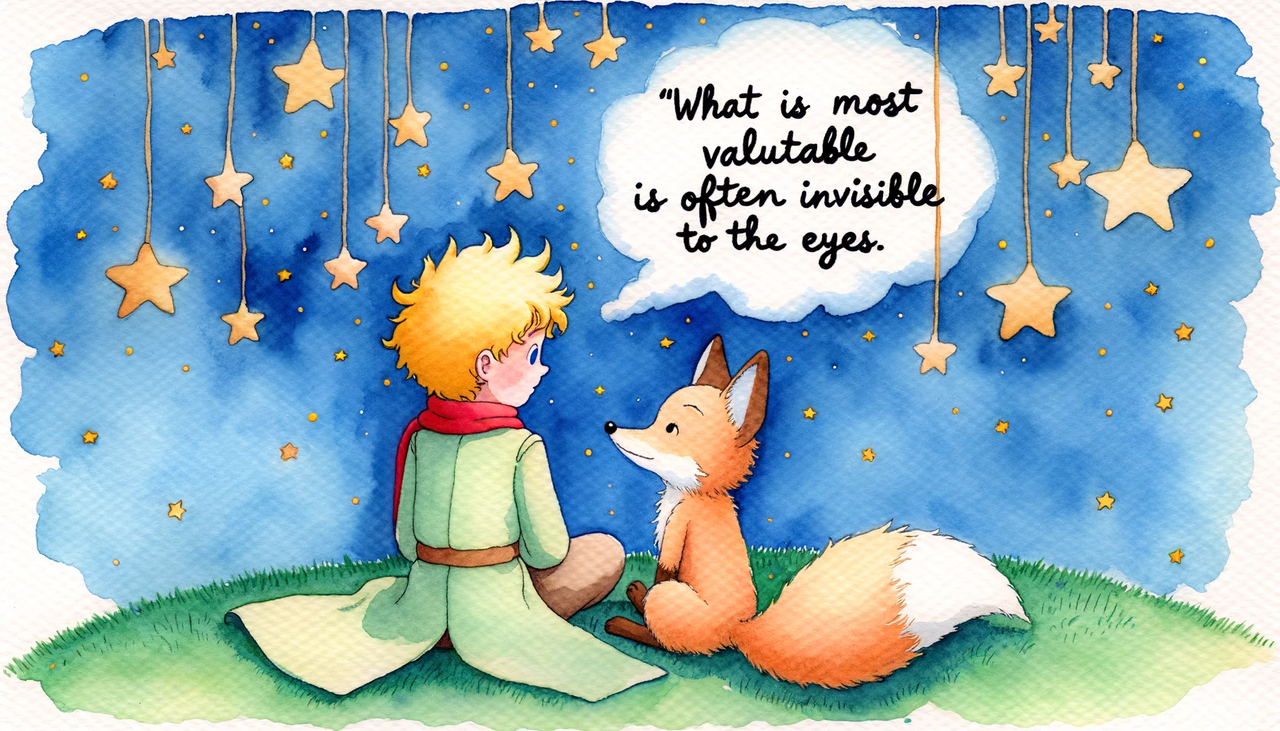
It was then that the fox appeared.
"Good morning," said the fox.
"Good morning," the little prince responded politely, although when he turned around he saw nothing.
"I am right here," the voice said, "under the apple tree."
"Who are you?" asked the little prince, and added, "You are very pretty to look at."
"I am a fox," the fox said.
"Come and play with me," proposed the little prince. "I am so unhappy."
"I cannot play with you," the fox said. "I am not tamed."
"Ah! Please excuse me," said the little prince.
But, after some thought, he added:
"What does that mean--'tame'?"
"You do not live here," said the fox. "What is it that you are looking for?"
"I am looking for men," said the little prince. "What does that mean--'tame'?"
"Men," said the fox. "They have guns, and they hunt. It is very disturbing. They also raise chickens. These are their only interests. Are you looking for chickens?"
"No," said the little prince. "I am looking for friends. What does that mean--'tame'?"
"It is an act too often neglected," said the fox. It means to establish ties."
"'To establish ties'?"
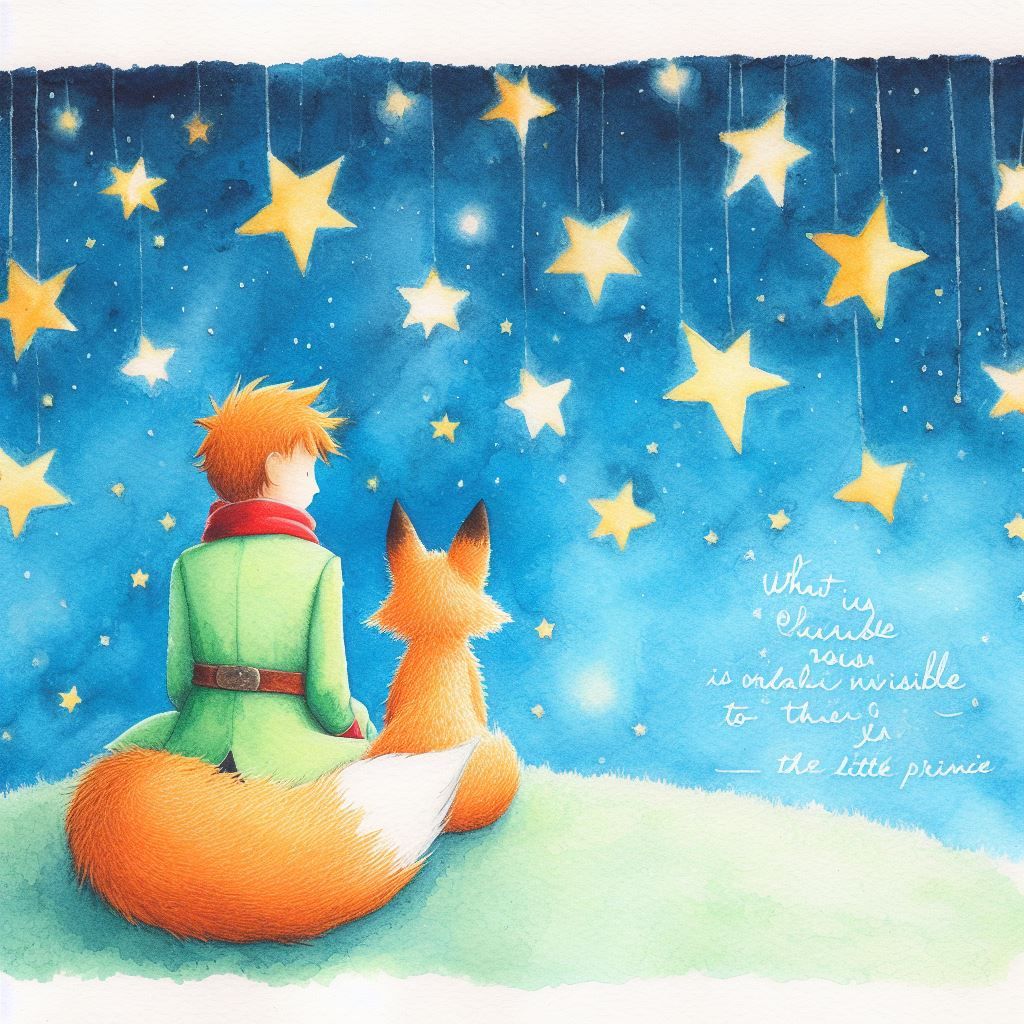
"Just that," said the fox. "To me, you are still nothing more than a little boy who is just like a hundred thousand other little boys. And I have no need of you. And you, on your part, have no need of me. To you, I am nothing more than a fox like a hundred thousand other foxes. But if you tame me, then we shall need each other. To me, you will be unique in all the world. To you, I shall be unique in all the world . . ."
"I am beginning to understand," said the little prince. "There is a flower . . . I think that she has tamed me . . ."
"It is possible," said the fox. "On the Earth one sees all sorts of things."
"Oh, but this is not on the Earth!" said the little prince.
The fox seemed perplexed, and very curious.
"On another planet?"
"Yes."
"Are there hunters on that planet?"
"No."
"Ah, that is interesting! Are there chickens?"
"No."
"Nothing is perfect," sighed the fox.
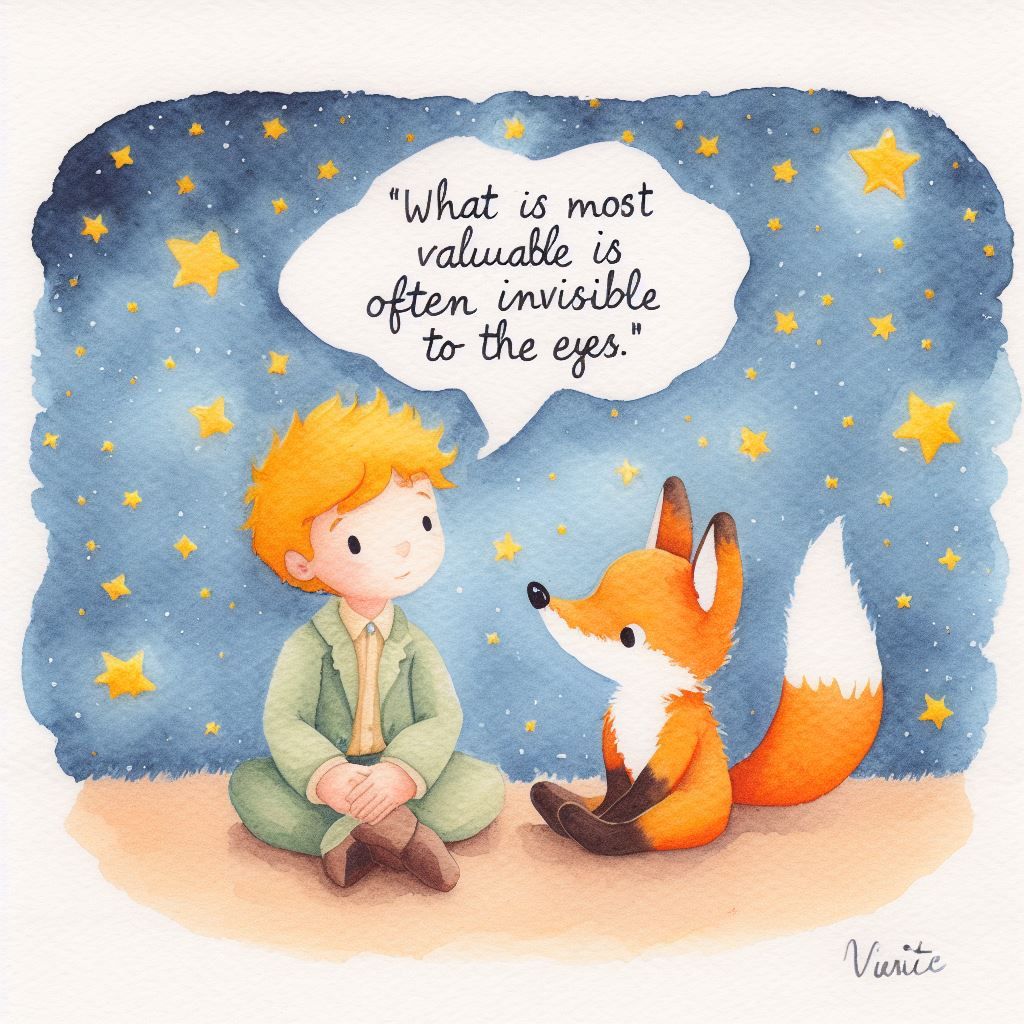
But he came back to his idea.
"My life is very monotonous," the fox said. "I hunt chickens; men hunt me. All the chickens are just alike, and all the men are just alike. And, in consequence, I am a little bored. But if you tame me, it will be as if the sun came to shine on my life. I shall know the sound of a step that will be different from all the others. Other steps send me hurrying back underneath the ground. Yours will call me, like music, out of my burrow. And then look: you see the grain-fields down yonder? I do not eat bread. Wheat is of no use to me. The wheat fields have nothing to say to me. And that is sad. But you have hair that is the color of gold. Think how wonderful that will be when you have tamed me! The grain, which is also golden, will bring me back the thought of you. And I shall love to listen to the wind in the wheat . . ."
The fox gazed at the little prince, for a long time.
"Please--tame me!" he said.
"I want to, very much," the little prince replied. "But I have not much time. I have friends to discover, and a great many things to understand."
"One only understands the things that one tames," said the fox. "Men have no more time to understand anything. They buy things all ready made at the shops. But there is no shop anywhere where one can buy friendship, and so men have no friends any more. If you want a friend, tame me . . ."
"What must I do, to tame you?" asked the little prince.
"You must be very patient," replied the fox. "First you will sit down at a little distance from me--like that--in the grass. I shall look at you out of the corner of my eye, and you will say nothing. Words are the source of misunderstandings. But you will sit a little closer to me, every day . . ."
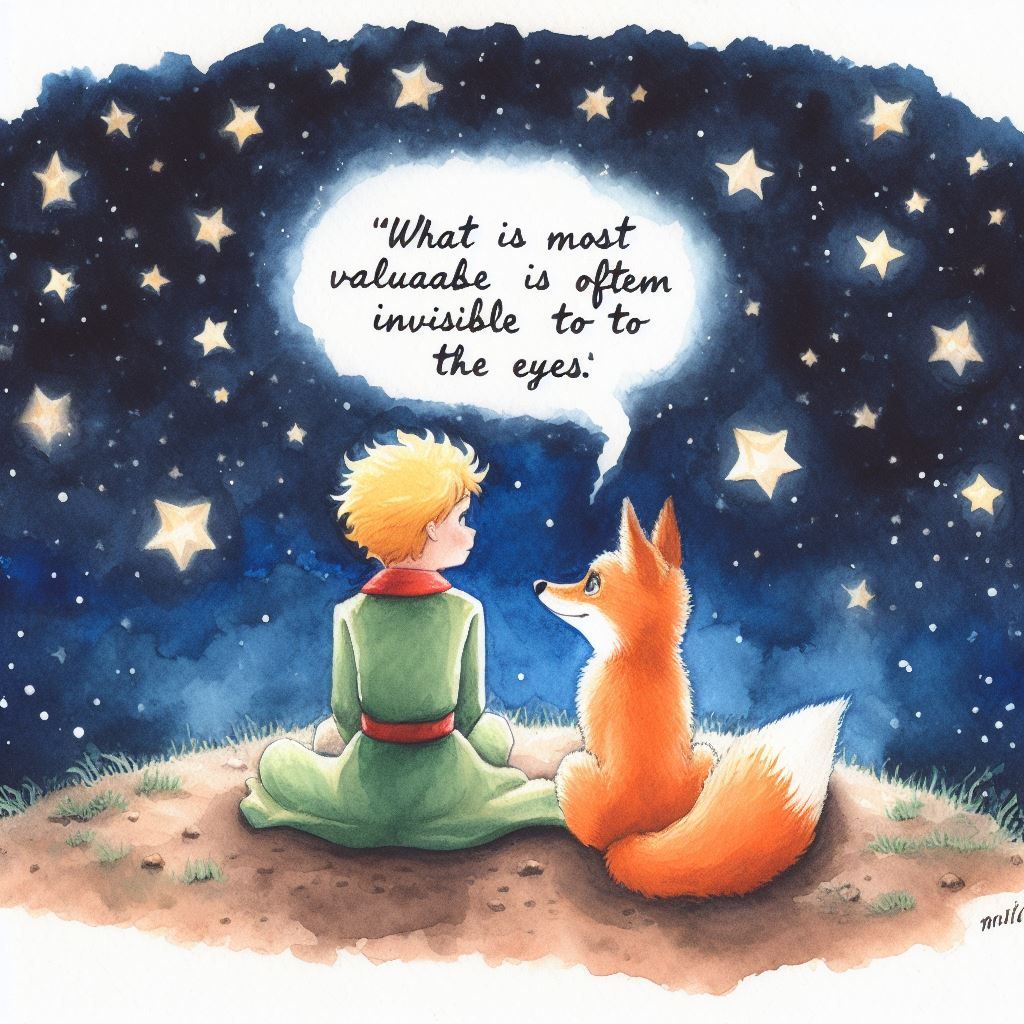
The next day the little prince came back.
"It would have been better to come back at the same hour," said the fox. "If, for example, you come at four o'clock in the afternoon, then at three o'clock I shall begin to be happy. I shall feel happier and happier as the hour advances. At four o'clock, I shall already be worrying and jumping about. I shall show you how happy I am! But if you come at just any time, I shall never know at what hour my heart is to be ready to greet you . . . One must observe the proper rites . . ."
"What is a rite?" asked the little prince.
"Those also are actions too often neglected," said the fox. "They are what make one day different from other days, one hour from other hours. There is a rite, for example, among my hunters. Every Thursday they dance with the village girls. So Thursday is a wonderful day for me! I can take a walk as far as the vineyards. But if the hunters danced at just any time, every day would be like every other day, and I should never have any vacation at all."
So the little prince tamed the fox. And when the hour of his departure drew near--
"Ah," said the fox, "I shall cry."
"It is your own fault," said the little prince. "I never wished you any sort of harm; but you wanted me to tame you . . ."
"Yes, that is so," said the fox.
"But now you are going to cry!" said the little prince.
"Yes, that is so," said the fox.
"Then it has done you no good at all!"
"It has done me good," said the fox, "because of the color of the wheat fields." And then he added:
"Go and look again at the roses. You will understand now that yours is unique in all the world. Then come back to say goodbye to me, and I will make you a present of a secret."
The little prince went away, to look again at the roses.
"You are not at all like my rose," he said. "As yet you are nothing. No one has tamed you, and you have tamed no one. You are like my fox when I first knew him. He was only a fox like a hundred thousand other foxes. But I have made him my friend, and now he is unique in all the world."
And the roses were very much embarassed.
"You are beautiful, but you are empty," he went on. "One could not die for you. To be sure, an ordinary passerby would think that my rose looked just like you--the rose that belongs to me. But in herself alone she is more important than all the hundreds of you other roses: because it is she that I have watered; because it is she that I have put under the glass globe; because it is she that I have sheltered behind the screen; because it is for her that I have killed the caterpillars (except the two or three that we saved to become butterflies); because it is she that I have listened to, when she grumbled, or boasted, or ever sometimes when she said nothing. Because she is my rose.
And he went back to meet the fox.
"Goodbye," he said.
"Goodbye," said the fox. "And now here is my secret, a very simple secret: It is only with the heart that one can see rightly; what is essential is invisible to the eye."
"What is essential is invisible to the eye," the little prince repeated, so that he would be sure to remember.
"It is the time you have wasted for your rose that makes your rose so important."
"It is the time I have wasted for my rose--" said the little prince, so that he would be sure to remember.
"Men have forgotten this truth," said the fox. "But you must not forget it. You become responsible, forever, for what you have tamed. You are responsible for your rose . . ."
"I am responsible for my rose," the little prince repeated, so that he would be sure to remember.

생텍쥐페리의 "어린 왕자" 21장은
작가의 인간의 관계와 인생의 의미에 대한 깊은 통찰을 보여줍니다.
여우는 누군가나 무언가와 깊고 의미 있는 연결을 형성하는
길들이기(taming)에 대한 이야기를 합니다.
길들이기는 시간, 인내심, 이해가 필요한 과정입니다.
사람과의 관계는 소유하는 것이 아니지요.
길들여가는 과정일 겁니다.
여우는 자신이 길들여졌다면
어린 왕자에게 자신을 대체할 수 있는 것은 없을 거라고 합니다.
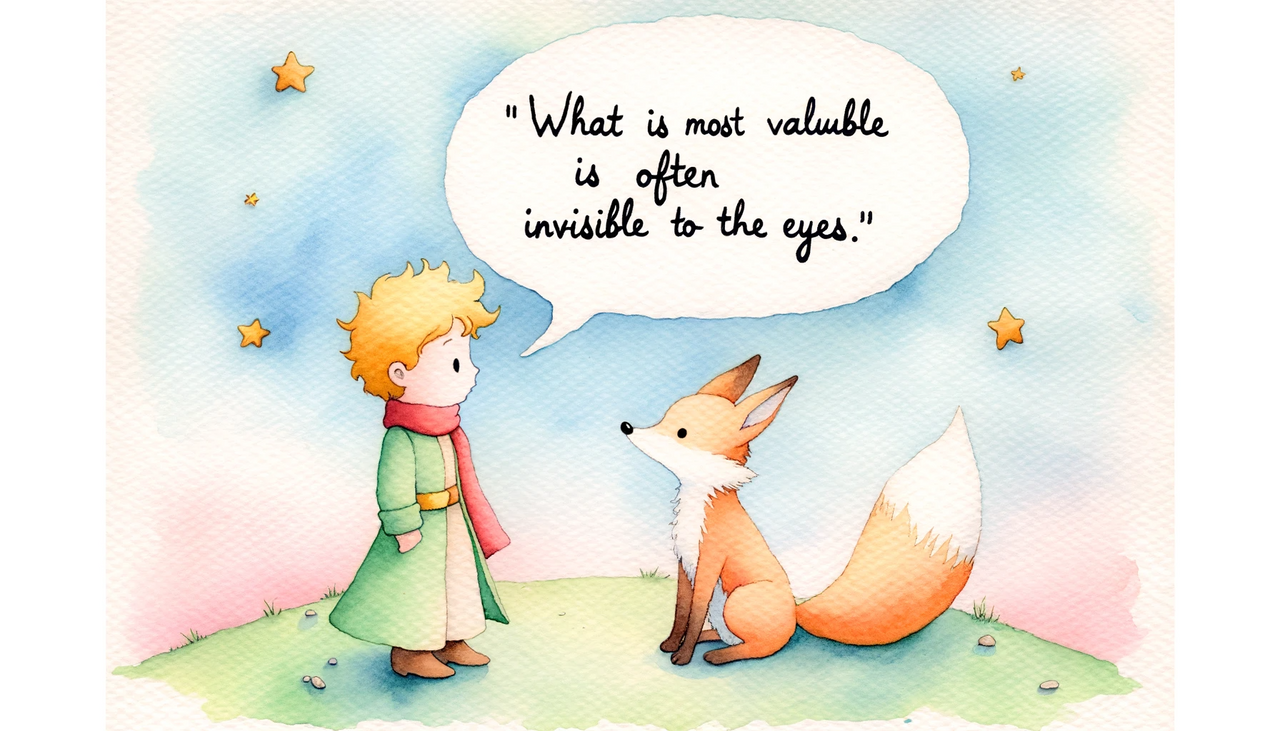
우리가 서로의 관계에 부여하는 가치는
개인적 경험과 감정에 기반하여 주관적이며,
타고난 특성이 아니라
시간과 공유된 경험을 통해 발전합니다.
시간은 소중한 자원이며,
그것에 공유한다는 것은
가장 소중한 가치를 공유하는 것일지도 모릅니다.
더 많은 시간, 더 의미있는 시간을 공유한다면
우리의 관계는 더 깊어질 것입니다.
여우는 또한 '의례(rite)'에 대한 이야기를 전합니다.
의례는 인간 관계의 구체적인 구조를 반영하며
예측가능하고 리드미컬합니다.
이를 통해 공유된 기억은 확장됩니다.
길들이는 행위는 책임을 수반합니다.

어린왕자와 장미의 관계를 떠올려 보세요.
누군가를 길들이면
우리는 영원히 서로의 행복에 대해 책임을 지겠다는 약속을 한 것입니다.
더 가까울 수록 책임도 더 커지는 법이지요.
'마음으로만 올바르게 볼 수 있어요; 눈에 보이지 않는 것이 중요해요.'
겉모습과 내면은 다릅니다.
진정한 이해는 겉모습을 통과하여 내면으로 들어가는 여정을 거쳐야 합니다.
내면으로 가는 여정이 성공했을 때,
눈에 보이지 않는 것들이 바야흐로 선명해집니다.
공유된 감정, 경험, 기억을 서로 볼 수 있게 됩니다.
어린왕자 이야기는
인간의 관계의 본질에 대한 통찰입니다.
오늘날의 디지털 시대에,
가볍고 피상적인 인간관계가 만연한 시대에,
어린왕자 이야기는
왜 우리가 더 깊고, 서로 이해하는 진정한 유대 관계를 가져야 하는지를
되돌아 볼 기회를 줍니다.
우리가 맺는 관계는 시간과 보살핌으로 형성되며,
이에 마땅한 의무를 가지고 있고,
눈에 보이지는 않지만, 가장 중요한 가치를 지니고 있는 것입니다.

Q: "길들이기"라는 과정은 인간 관계의 문맥에서 무엇을 의미합니까?
A: 인간 관계의 문맥에서 "길들이기"는 점진적으로 누군가를 알아가고, 그들을 깊이 이해하고, 단순한 지인을 초월한 유대를 형성하는 것을 나타냅니다. 진정한 연결은 노력, 시간, 인내가 필요하다는 것을 강조합니다.
Q: 왜 작가는 이 개념을 소개하기 위해 여우를 선택했을까요?
A: 여우는 보통 인간과 유대를 맺지 않는 대표적인 야생 동물입니다. 작가는 여우를 선택함으로써 진정한 관계의 힘을 이야기하고 있는지도 모릅니다. 우리와 관계가 아주 먼 여우와 같은 야생동물마저도 길들인다면 소중하고 유의미한 관계가 될 수 있는 것이지요.
Q: "고유함(unique)"의 개념이 우리의 개인적 연결에 어떻게 작용합니까?
A: 고유함은 각 관계가 그것을 형성하는 개별적인 공유된 경험, 감정, 기억 때문에 구별된다는 의미입니다. 우리가 연결하는 모든 개인이 다른 사람에 의해 대체되거나 복제될 수 없는 특별한 자리를 차지하고 있습니다.
Q: 인간관계가 주관적이라면, 사회적 관계에 대한 견해가 개인적인 유대에 어떤 영향을 미칠까요?
A: 사회는 관계에 대한 특정한 기대와 규범을 부과하기 때문에, 개인적인 유대는 주관적이지만, 사회적 견해는 우리의 인식을 영향을 미칠 수 있습니다. 이로 인해 우리는 특정 관계를 우선시하거나 외부 표준을 기반으로 그 가치를 판단하기도 합니다. 사회적 기대와 진정한 개인적 연결 사이에서 분별하는 것이 중요합니다.
Q: 의례와 전통은 인간 관계를 확고히 하는 데 어떤 역할을 할까요?
A: 함께 커피를 마시는 것과 같은 일상생활은 인간관계에 예측 가능성과 단단한 구조를 제공합니다. 공유된 기억을 만들고, 소속감을 자극하며, 개인 사이의 유대를 강화하는 소중한 전통으로 이어질 수 있습니다.
Q: 디지털 환경의 발전에 따라, 관계의 책임 측면이 어떻게 변하고 있는가?
A: 디지털 시대는 사람들이 쉽게 연결될 수 있는 도구를 주었지만, 더 깊은 인간관계를 맺는 것을 어렵게도 만들었습니다. 항상 연결되어 있어야 하는 강박을 만들어 내기도 하고 이로 인한 피로나 오해가 생기기도 합니다. 이 시대의 관계의 책임에는 서로의 경계를 존중하고, 상호작용 중에 현재 상태를 유지하고, 서로의 대화의 미묘한 차이를 이해하는 능력을 키워야 합니다.
Q: 오늘날의 세계에서 진정한 연결을 유지하는 데 있어 여우와 작은 왕자로부터의 교훈은 어떻게 적용될 수 있을까요?
A: 인간관계에서 넓이보다 깊이를 우선시하고, 개인을 이해하는 데 시간과 노력을 투자하며, 관계에 수반되는 서로의 의무를 인정하고 이행하며, 상대의 진정한 본질을 평가하는 데 있어 내면을 중시해야 합니다. 이를 적용하기 위해서 우리가 할 일은 더 깊은 대화를 나누는 것, 상호 작용 중에 현재 상태를 유지하는 것, 공유된 기억을 만드는 것, 진정한 유대의 기초를 형성하는 눈에 보이지 않지만 가치 있는 것들을 실천하는 일일 것입니다.
This passage is from "The Little Prince" by Antoine de Saint-Exupéry. It contains profound insights about human connections, relationships, and the meaning of life. Let's break down the primary themes and their implications:
Taming & Relationships:
The fox introduces the concept of "taming," which represents the process of forming deep, meaningful connections with someone or something. This isn't a connection that occurs instantly; it requires time, patience, and understanding.
Implication: Relationships are not about possession but about mutual understanding and respect. They require investment.
Uniqueness & Value:
The fox emphasizes that, to him, the little prince would be unique and irreplaceable, just as he would be to the little prince if tamed.
Implication: The value we assign to relationships is subjective and based on our personal experiences and emotions. It's not an inherent trait but something developed over time and through shared experiences.
Time & Effort:
The fox's idea of anticipating the little prince's visits highlights how the investment of time amplifies emotions and the significance of a relationship.
Implication: Time is a precious resource, and where we choose to invest it reflects what we value. It's not about the quantity but the quality of time spent that deepens bonds.
Rites & Rituals:
The fox's mention of "rites" stresses the importance of consistency and rituals in establishing a sense of belonging and understanding.
Implication: Rituals give structure and predictability to relationships, establishing a rhythm and creating shared memories.
Responsibility & Care:
The act of taming also carries a responsibility, as noted by the fox and later emphasized with the rose. If you tame someone, you're forever responsible for their well-being.
Implication: Relationships carry obligations. The deeper the bond, the greater the responsibility.
Inner Beauty & Essence:
"It is only with the heart that one can see rightly; what is essential is invisible to the eye." This central theme of the story emphasizes the distinction between superficial appearances and inner essence.
Implication: True understanding and appreciation come from looking beyond the surface. It's our emotions, experiences, and shared memories that provide true insight.
In the broader context, this story serves as a timeless reminder of the essence of human connections. In today's digital age, where superficial connections are plentiful, the tale's themes are a nudge towards seeking depth, understanding, and genuine bonds.
The lessons from the fox and the little prince are eternal: Relationships are forged with time and care, they carry responsibilities, and it's the intangible that holds the most value.
Q: What does the process of "taming" signify in the context of human relationships?
A: "Taming" in the context of human relationships represents the gradual process of getting to know someone, understanding them deeply, and forming a bond that transcends mere acquaintance. It underscores the idea that true connections require effort, time, and patience.
Q: Why might the author have chosen the fox to introduce this concept?
A: The fox, being a wild animal, is not naturally inclined to form close bonds with humans. By choosing the fox, Saint-Exupéry highlights the transformative power of genuine connection – turning something wild and unfamiliar into something cherished and understood.
Q: How does the concept of "uniqueness" play into our personal connections?
A: Uniqueness emphasizes that each relationship is distinct because of the individual shared experiences, emotions, and memories that shape it. It's a testament to the idea that every individual we connect with holds a special place that cannot be replaced or replicated by another.
Q: If relationships are subjective, how does society's view on relationships influence our personal bonds?
A: Society often imposes certain expectations and norms regarding relationships. While personal bonds are subjective, societal views can influence our perceptions, causing us to prioritize certain relationships or judge their worth based on external standards. It's essential to discern between societal expectations and genuine personal connections.
Q: How do rites and rituals play a role in cementing modern relationships?
A: Rites and rituals, whether it's a weekly video call, annual vacations, or daily routines like having coffee together, provide predictability and structure in relationships. They create shared memories, foster a sense of belonging, and become cherished traditions that strengthen the bond between individuals.
Q: With the evolving digital landscape, how do you think the responsibility aspect of relationships is changing?
A: The digital age has made it easier to form connections, but it also poses challenges in maintaining them. With the ease of communication, there's an expectation of constant availability, sometimes leading to burnout or misunderstandings. The responsibility in relationships now includes being respectful of digital boundaries, being present during interactions, and understanding the nuances of online communication.
Q: How can the lessons from the fox and the little prince be applied in fostering genuine connections in today's world?
A: The lessons suggest prioritizing depth over breadth in relationships, investing time and effort in understanding individuals, acknowledging and fulfilling the responsibilities that come with connections, and looking beyond superficialities to appreciate the true essence of a person. In today's world, this could mean taking the time to have deeper conversations, being present during interactions, creating shared memories, and valuing the intangibles that form the foundation of genuine bonds.
